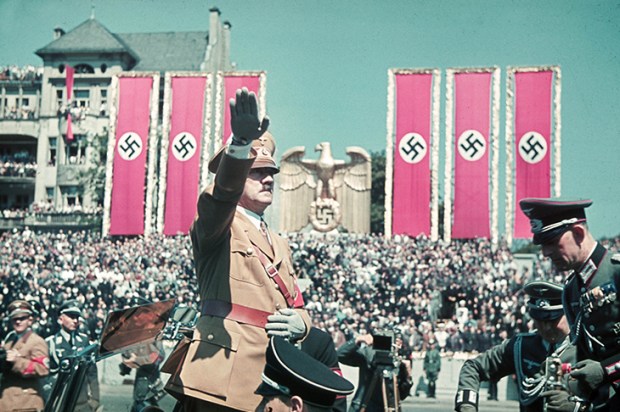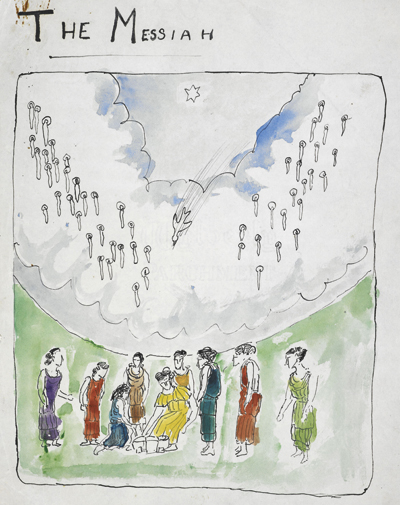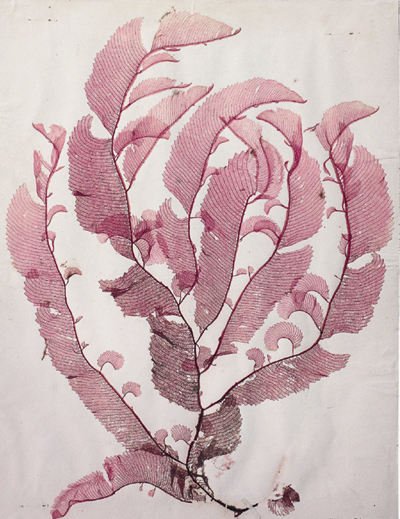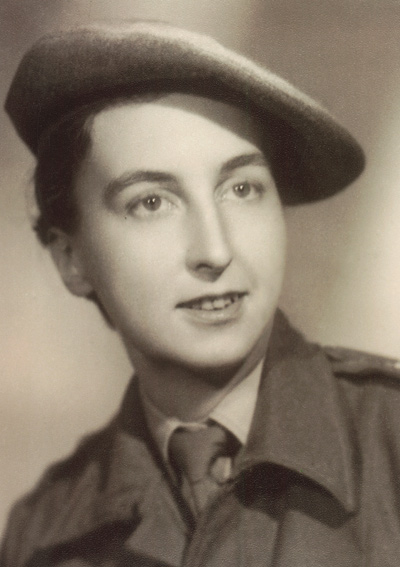This is the third volume of Isaiah Berlin letters; one more to go. Discerning critics have showered the first two with praise, and there is no absence of the laudable here. The plums are unforgettable, especially the brief character studies of Maurice Bowra, Enid Starkie, Randolph Churchill, Golda Meir and Stravinsky, should anyone want to know who and what these people were. Of course, Isaiah himself is the centre of attention, and a growing number of people have never heard of him.
Those who met him in this period met an intellectual superstar, a celebrity courted by princes, politicians and plutocrats, thirsting for his company and his approval. Not so many philosophers — but, my! he was a big orange. Many of those taught by him were changed for life.
He opened up the ways to wisdom by bestowing both glamour and correct pronunciation on the Russian intelligentsia under the tsars; by quizzing the German philosophers from Heine’s point of view rather than the Marxist; and by presenting the Enlightenment as a brilliant nursery where infant prodigies played with dangerous toys.
After one of Isaiah’s lectures we felt that we owned a box at the opera. The mediocrity of our actual lives, the pale hue of our thoughts, had evaporated. He was a wizard; we flew to the enchanter. He was a magus (Robert Robinson); we were dazzled by the exuberance of his verbosity. These letters do nothing to dispel the magic, though some complain that writing to many correspondents took up so much of his time that he was unable to settle down and write a big book.
But what about? asked his critics. Not philosophy; he admitted his inability to perform what he so cleverly expounded. Not proper history, based on archives and patient drudgery. Not political theory, however lucid his work on the theories of others. His own ideas were typically liberal, although his pen was apparently at the service of the Blues in the Cold War against the Reds.
His familiarity with big money, incessant first-class travel, smart parties and the pleasures of the rich (his pains eased by mud baths in an Italian spa) led to the conclusion that he was being well rewarded for his anti-Marxist polemic, and for his refusal to condemn US foreign policy. He had sold out; and could be described by A.J.P. Taylor as ‘a well-known socialite’ rather than, say, ‘a moral giant compared to me’.
To this day he is blamed for scotching the appointment of the Trotsky-worshipping biographer Isaac Deutscher to a Chair of Russian history at Oxford. He was eager to deny that; he had merely refused to recommend for this job one better suited to others. Even worse, a former Israeli terrorist accused him of not having consistently supported the Zionist cause.
This bipartisan hostility from the left, the new left, and much of the old guard at Oxford, wounded him more than it should have because it fed his self-doubt, and the applause of his ‘hideous, embarrassing right-wing supporters, who are the permanent menace of my life’ was no consolation.
Those lectures, which sounded like an unforced torrent of words, were laboriously prepared and delivered after sleepless nights. Isaiah had no inner confidence at the lectern, and here writes of his memorable lecture on Turgenev: ‘First I make a mistake and then I build more theory on it.’ He agreed with his enemies about his mental failings: ‘I was never much good at Latin and Greek, and worse still at mathematics. So how I managed what I did manage remains a mystery.’
His ability to see at least two sides to any question was not useful to his would-be allies. He refused to come down unequivocally in support of the Eichmann death sentence, the Algerian rebellion, the new left, or even the admission of women fellows to his own college, All Souls. His adored wife Aline ‘thinks that would be far, far worse than having four new bars at the Ritz’ — i.e. would introduce the less congenial.
Intellectual thugs like the Labour minister Richard Crossman accused him of ‘equipping students with ingenious justifications for political inactivity and social disbelief’. Whatever that may have meant, Berlin never came out with a full knock-down answer to the critics of western liberal democracy; ‘no demand, no supply’ was his excuse in the early Sixties, when so few outside the Iron Curtain really hated and rejected it; but that would soon change. By 1967 he was protesting: ‘I just like interesting ideas: not the one clear permanent truth’; and in 1968: ‘I really cannot bear this Hobbesian world in which no one is safe from maniacs and all forms of life tremble on the verge of collapse; I long for some bourgeois stability.’
He also longed for an internationale of ‘lucid, scholarly, moderate thinkers’, when such beings were rare even at Oxford. Even there, he was not fully equipped to get what he wanted. To profess ‘love and faith’ to Warden Sparrow after opposing him in a college vote (see letter of 14 March 1964) and then find himself outmanoeuvred and diddled by the love-object, was a needless humiliation. To react with such vigour to the polemics of the Soviet apologist E.H. Carr was necessary; to insist that Carr was really a nice chap was not. To respond with indignation to personal slights and betrayals was a waste of energy. He could not bear that anyone should think that he came from a ghetto, spoke Yiddish or was in any way not what he seemed.
But it was all so long ago. Now, can we look back and sing with Dryden: ‘Thy chase had a beast in view, thy wars brought nothing about, thy lovers were all untrue’? Some of his chases were certainly futile. His hope of a conciliatory Israeli foreign policy, with compensation for displaced Palestinians, came to nothing. His longing for feet at which he could sit and learn, provided they ended the legs of a sage of similar stature to the great teachers of the past (Socrates, Michelet, Weber, Wilamowitz, Mill, for example) was doomed to disappointment. He found none, and the people he ‘worshipped’, like Edmund Wilson, had little to teach him.
However, his wars did bring about at least two good things. As a director of the Royal Opera at Covent Garden he fought hard and successfully to revive the house with a blood transfusion of new singers, conductors and musicians, and so contributed to some of the greatest performances of the period, with Giulini and Solti as musical directors.
And at Oxford, where the university was bored to tears by the plight of its many good, bad, and indifferent employees denied fellowships at colleges, he took decisive action. Against the advice of many old friends, he adopted a group of the unplaced, who had formed what Bowra called one of the ‘luncheon clubs… for the scrubbiest scrubs to be found in Oxford’, and made them the nucleus of a new graduate college, mainly for scientists but not excluding others.
Isaiah had been converted to the view that scientists ‘seem to be a wonderful body of men, upon whom I look with almost mystical adoration’, and on their behalf he fought the anti-scientific and anti-graduate prejudices of some colleagues, and the anti-Oxford prejudices of some politicians, and won. Some of the less fascinating letters are devoted to raising money for this brainchild, both from the Wolfson family and from McGeorge Bundy at the Ford Foundation; but this was a famous achievement, even if the design of the building by the Cherwell was not as much like Portofino as he had hoped it would be. Wolfson College was a life-belt in the choppy sea of graduate woe.
Lovers all untrue? Not a bit of it. Half the septuagenarian liberals in Europe, Asia and America remain to attest the contrary, and Chatto & Windus must be counting on their having saved up enough to afford this beautifully produced and edited collection, well up to the standard of the first two volumes. Younger readers may be surprised at a comment in 1965 on America’s ‘negro problem’:
Even if full rights are granted them, jobs given, total social equality ensured… any chemist who invented a substance that would bleach them and uncrinkle their hair would help a great deal more than a lot of good, decent liberals.
History is full of the unexpected; but that, after all, was aimed at whites rather than blacks.
Got something to add? Join the discussion and comment below.
Get 10 issues for just $10
Subscribe to The Spectator Australia today for the next 10 magazine issues, plus full online access, for just $10.
You might disagree with half of it, but you’ll enjoy reading all of it. Try your first month for free, then just $2 a week for the remainder of your first year.












Comments
Don't miss out
Join the conversation with other Spectator Australia readers. Subscribe to leave a comment.
SUBSCRIBEAlready a subscriber? Log in